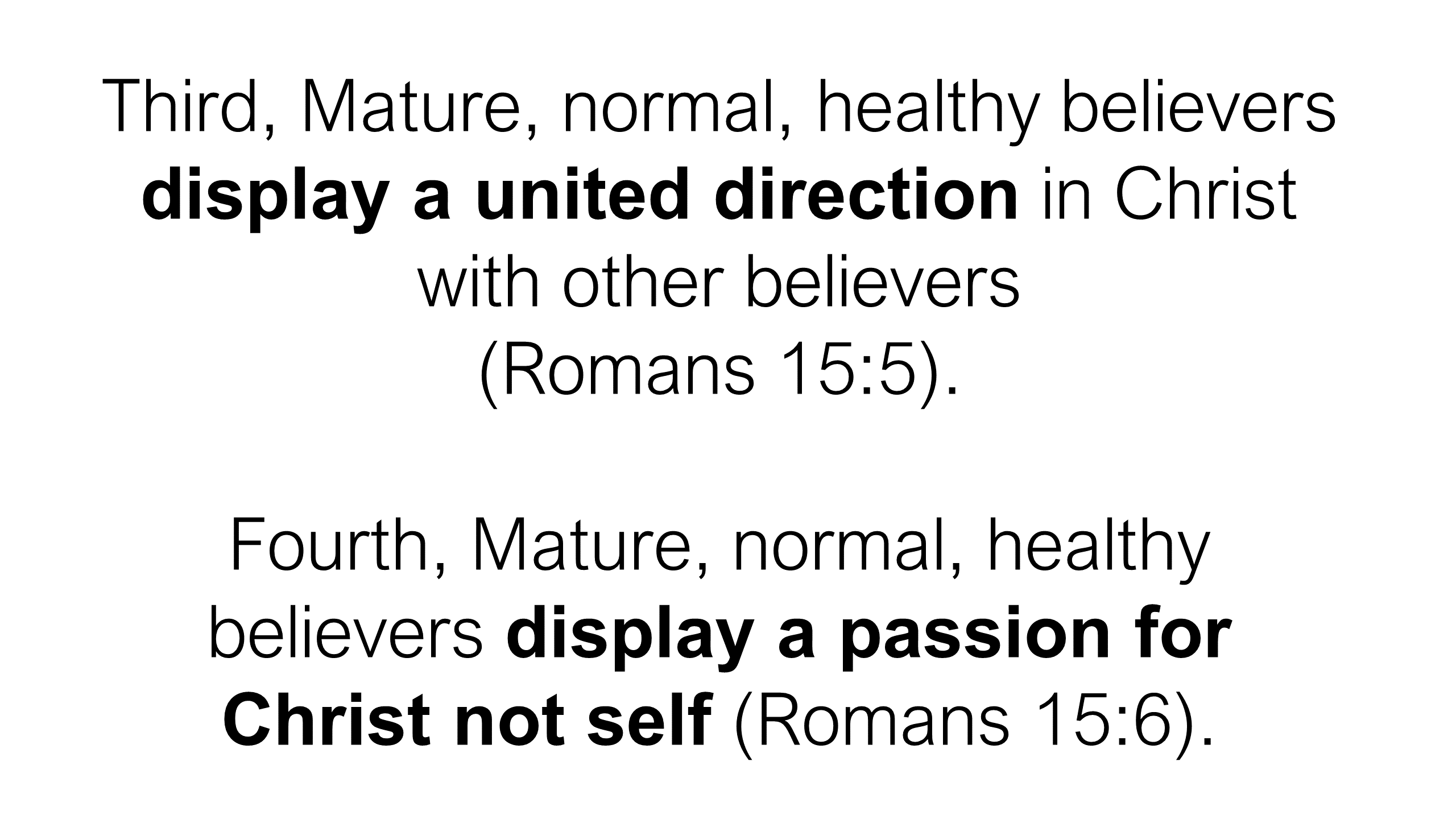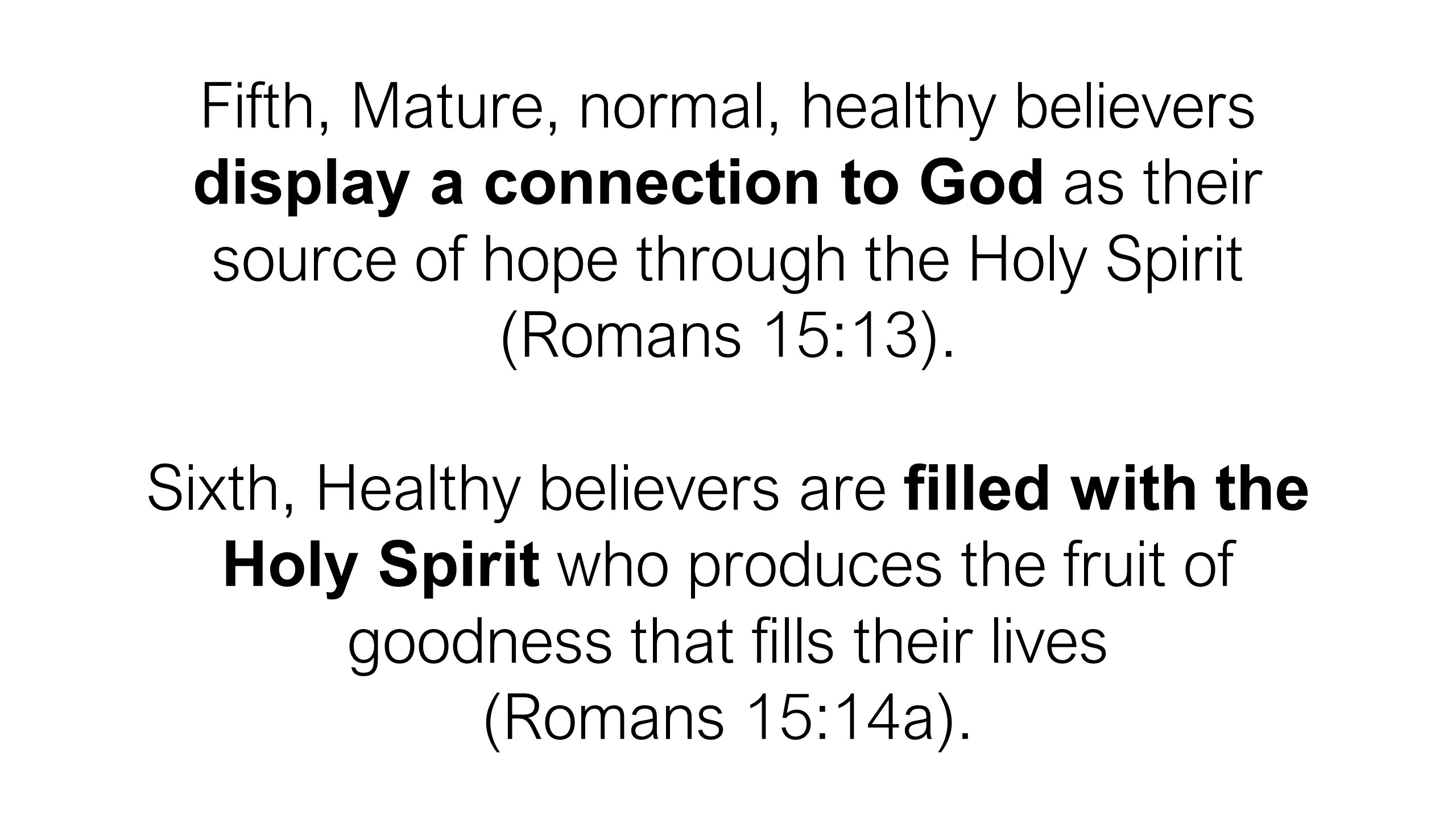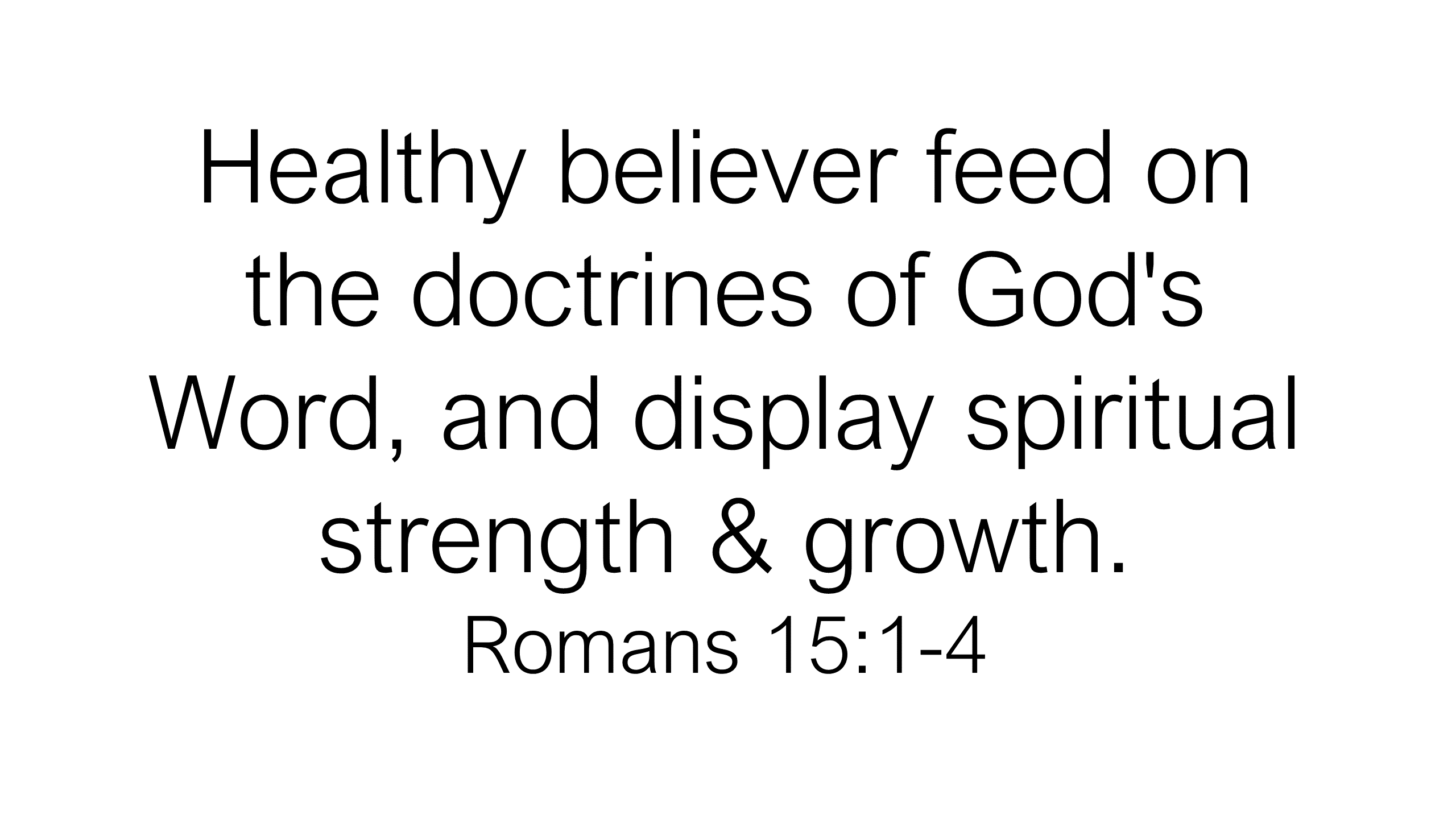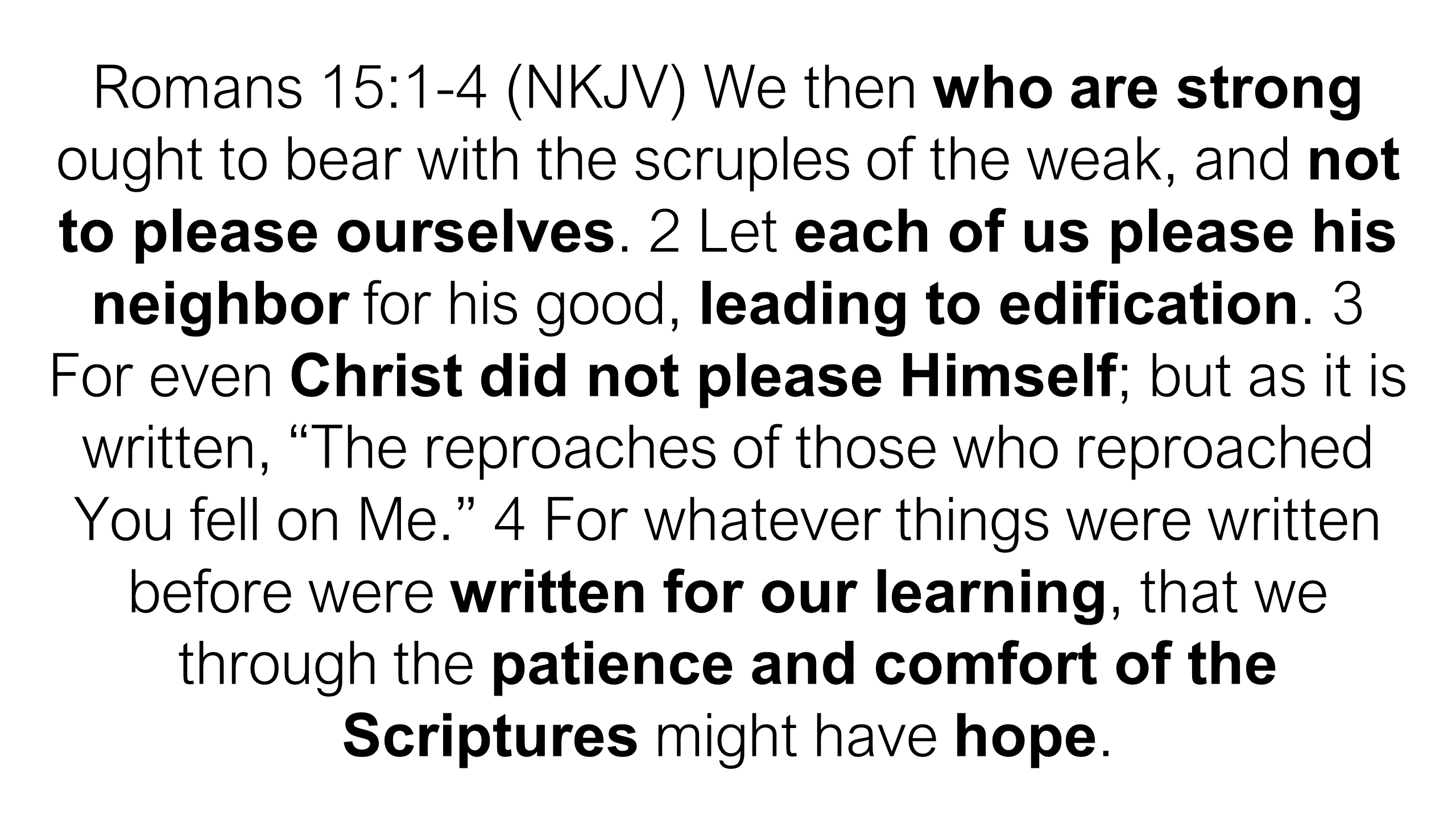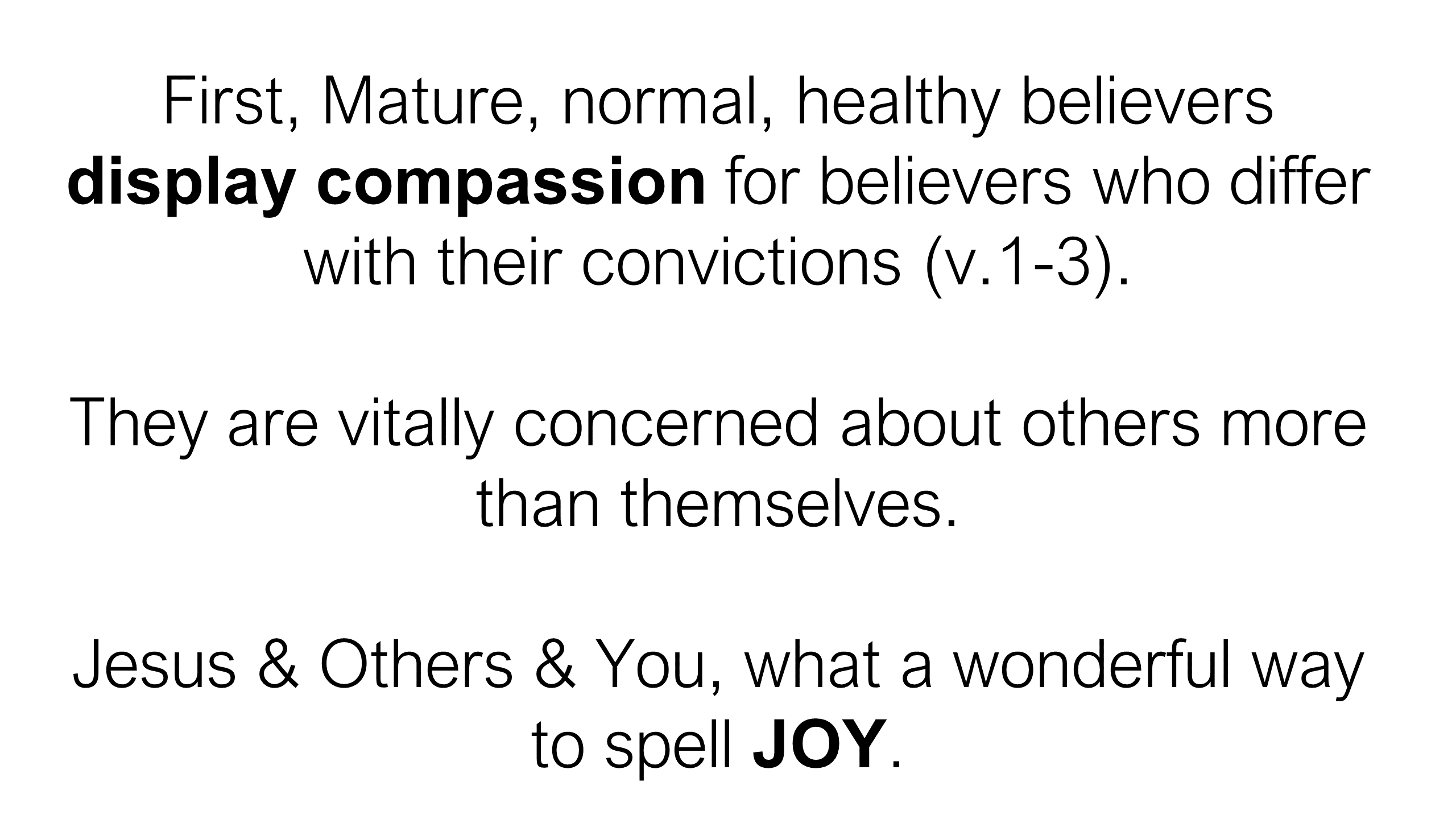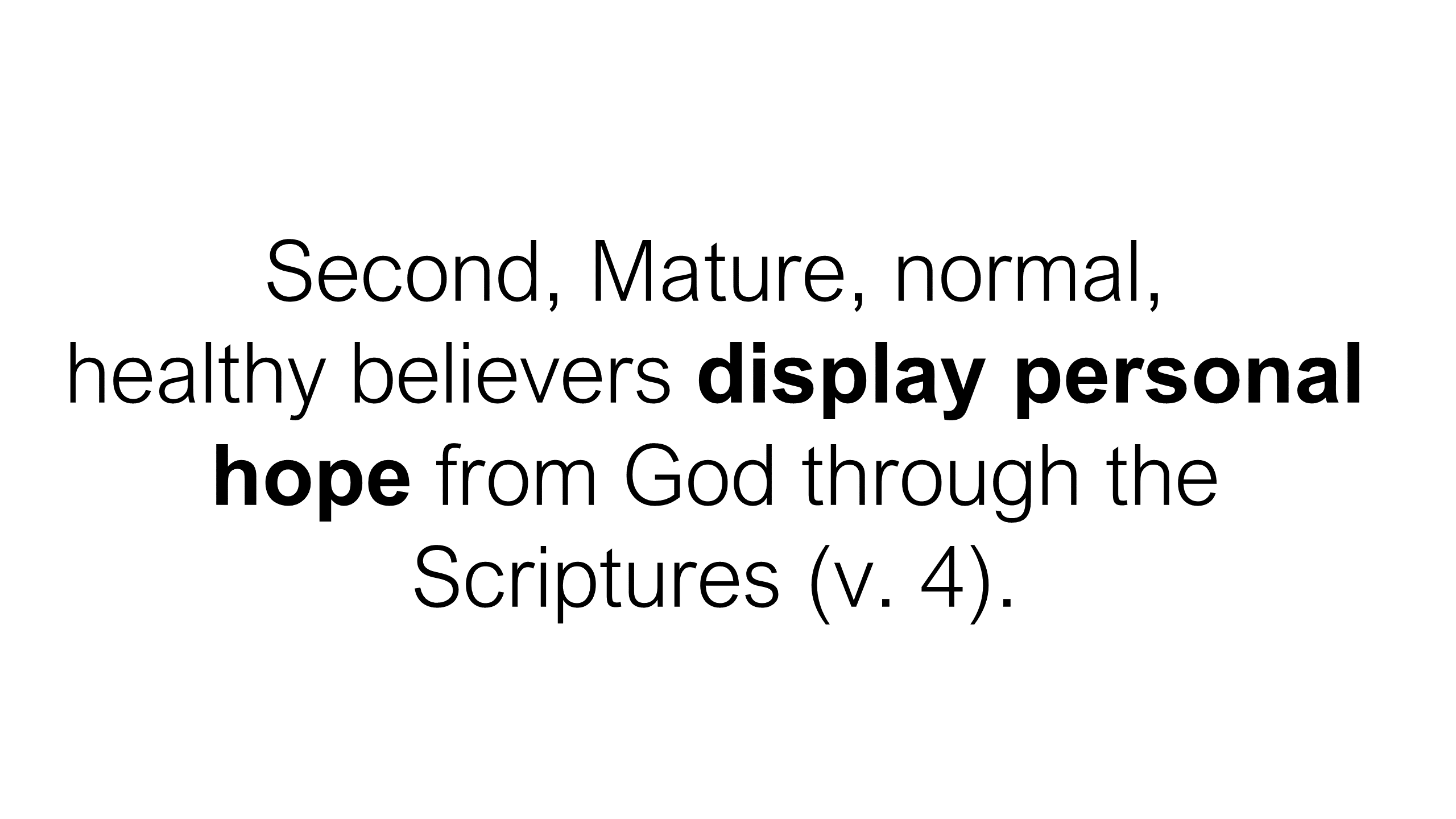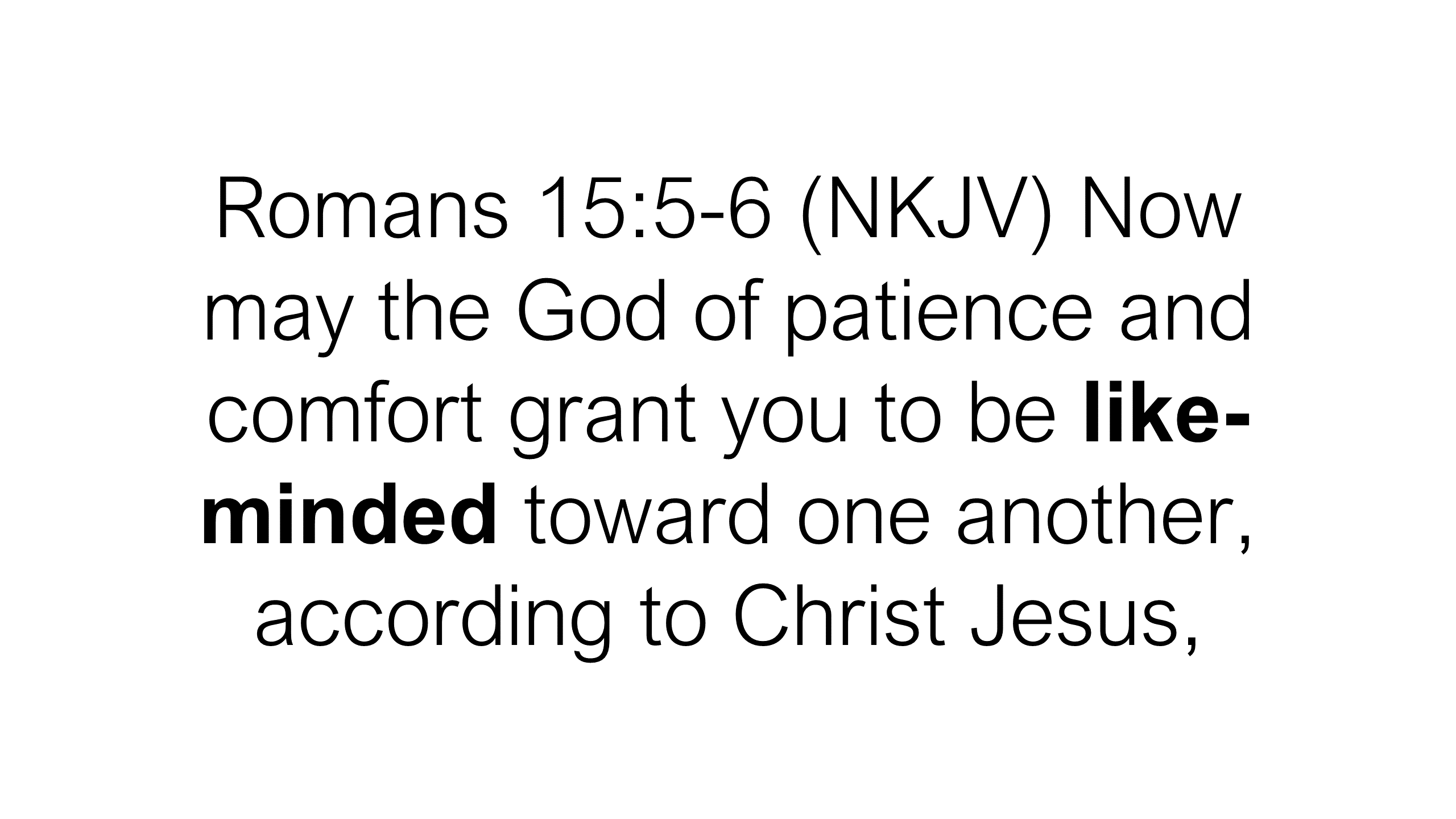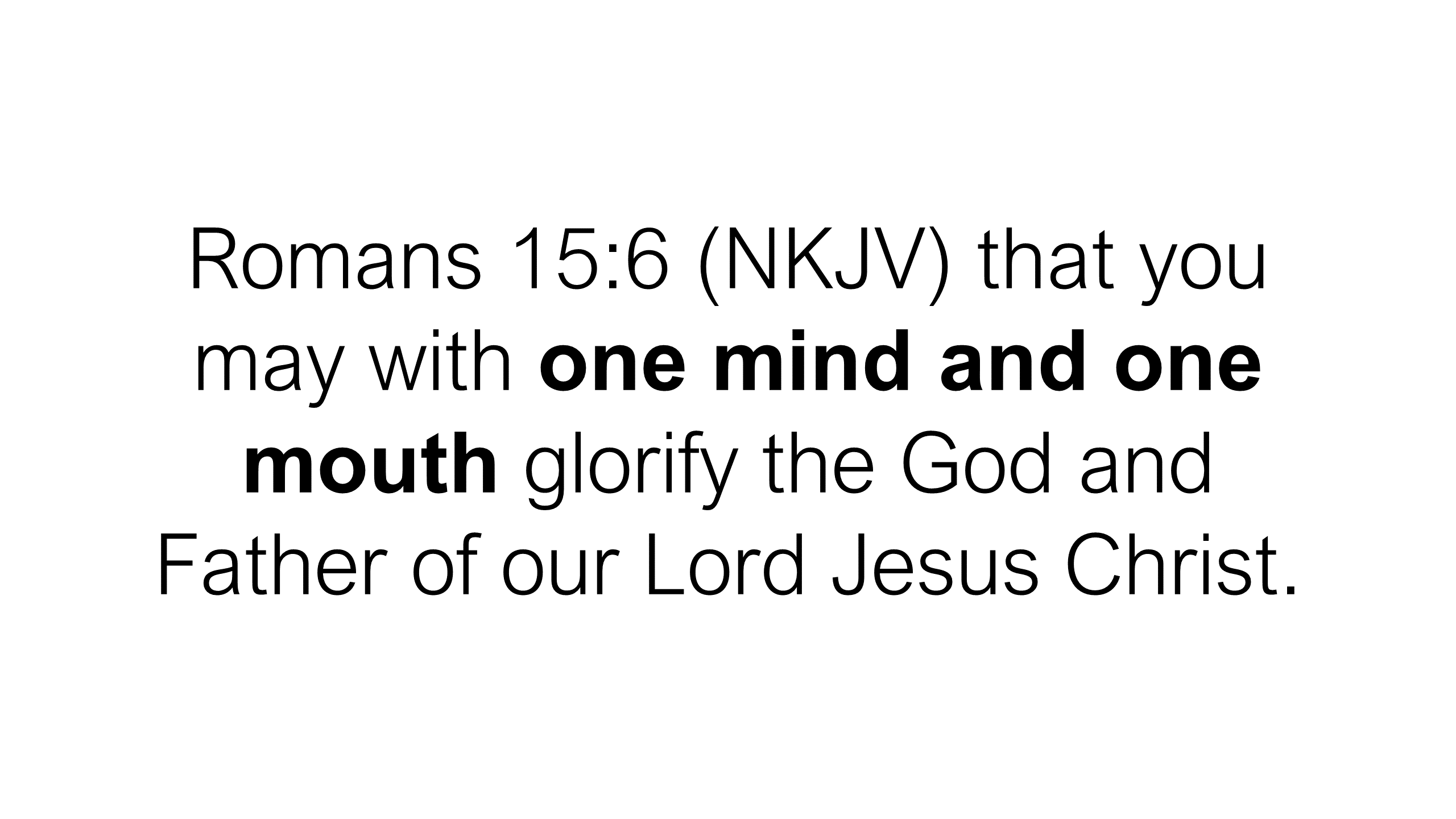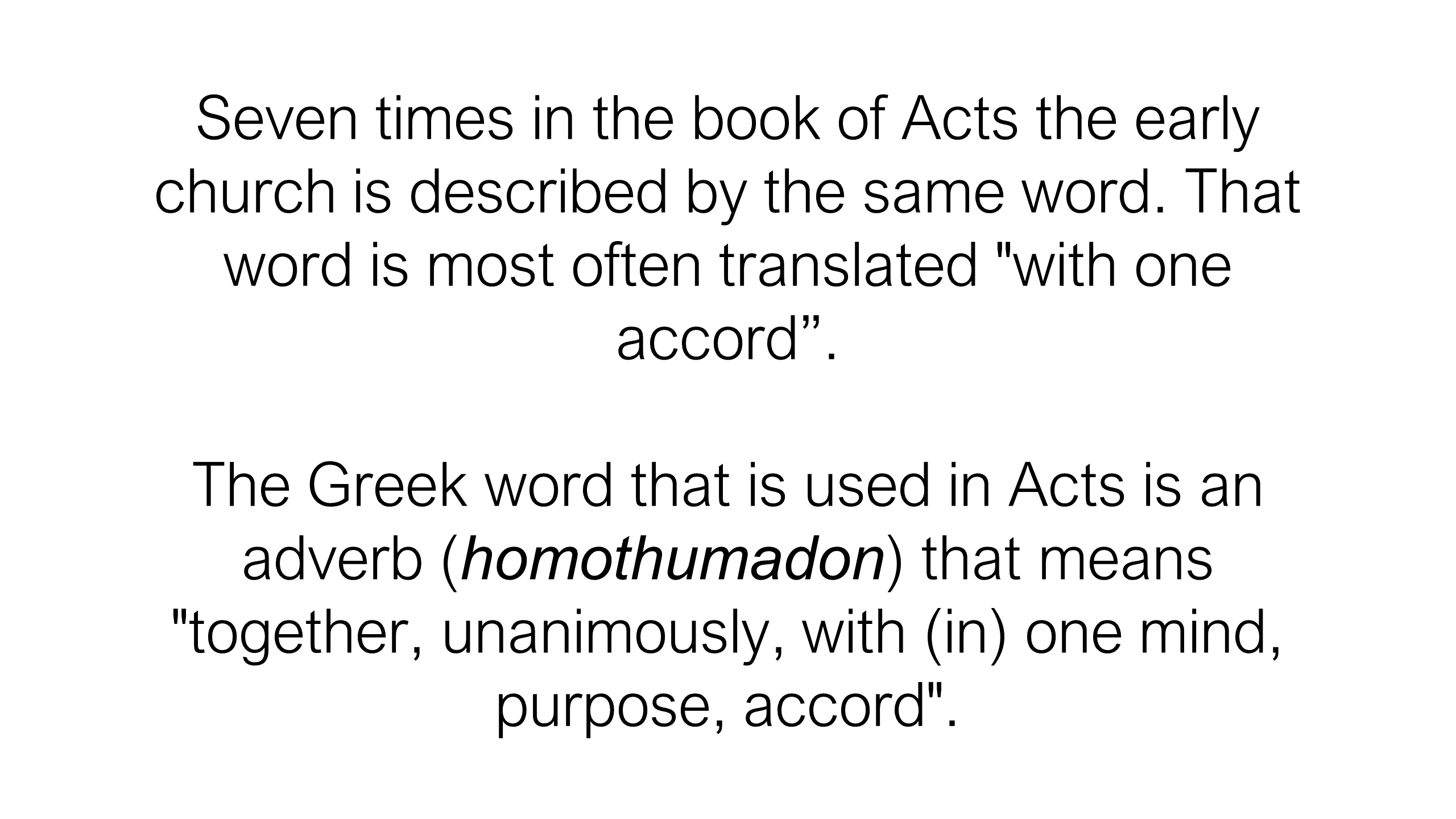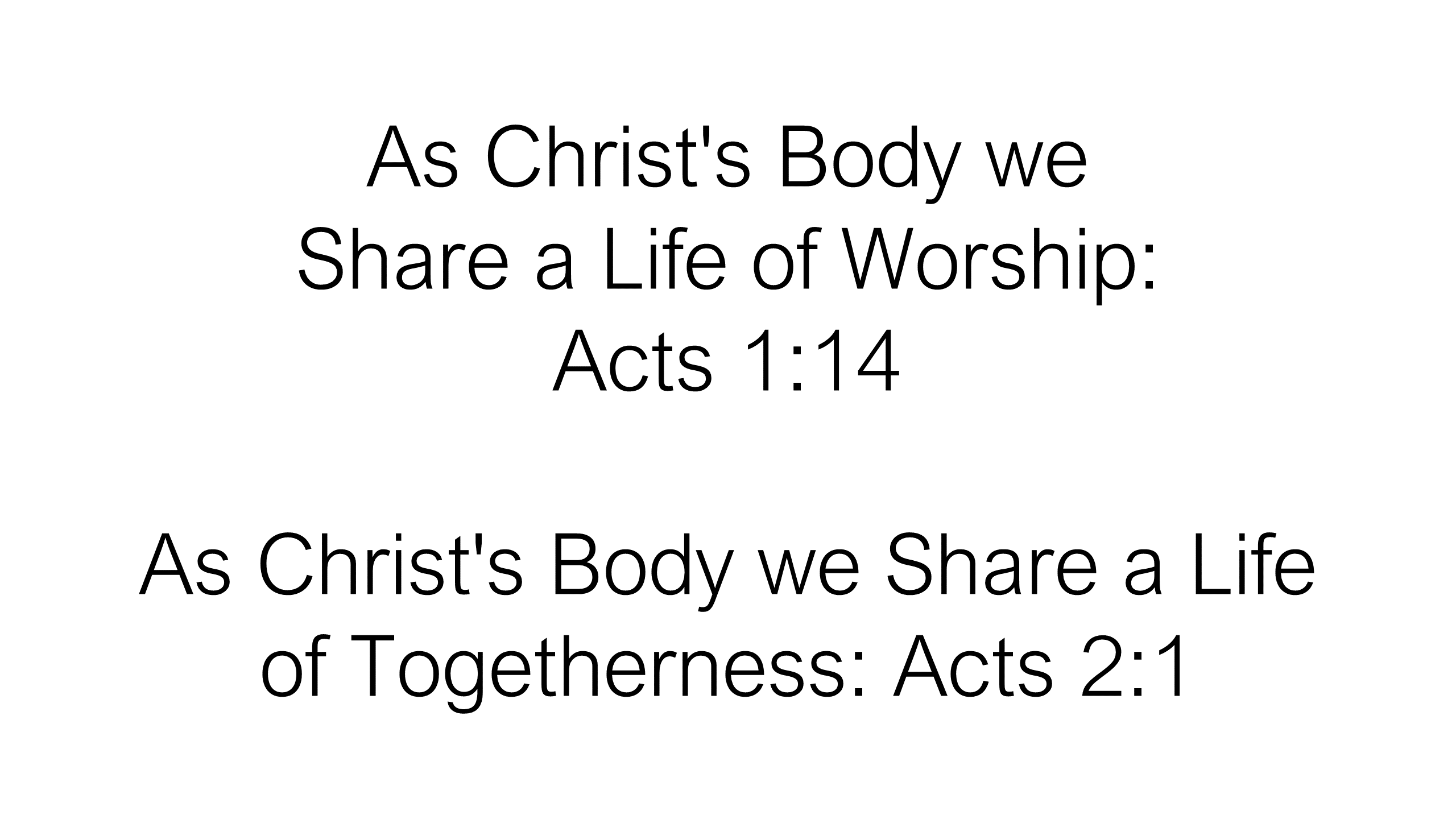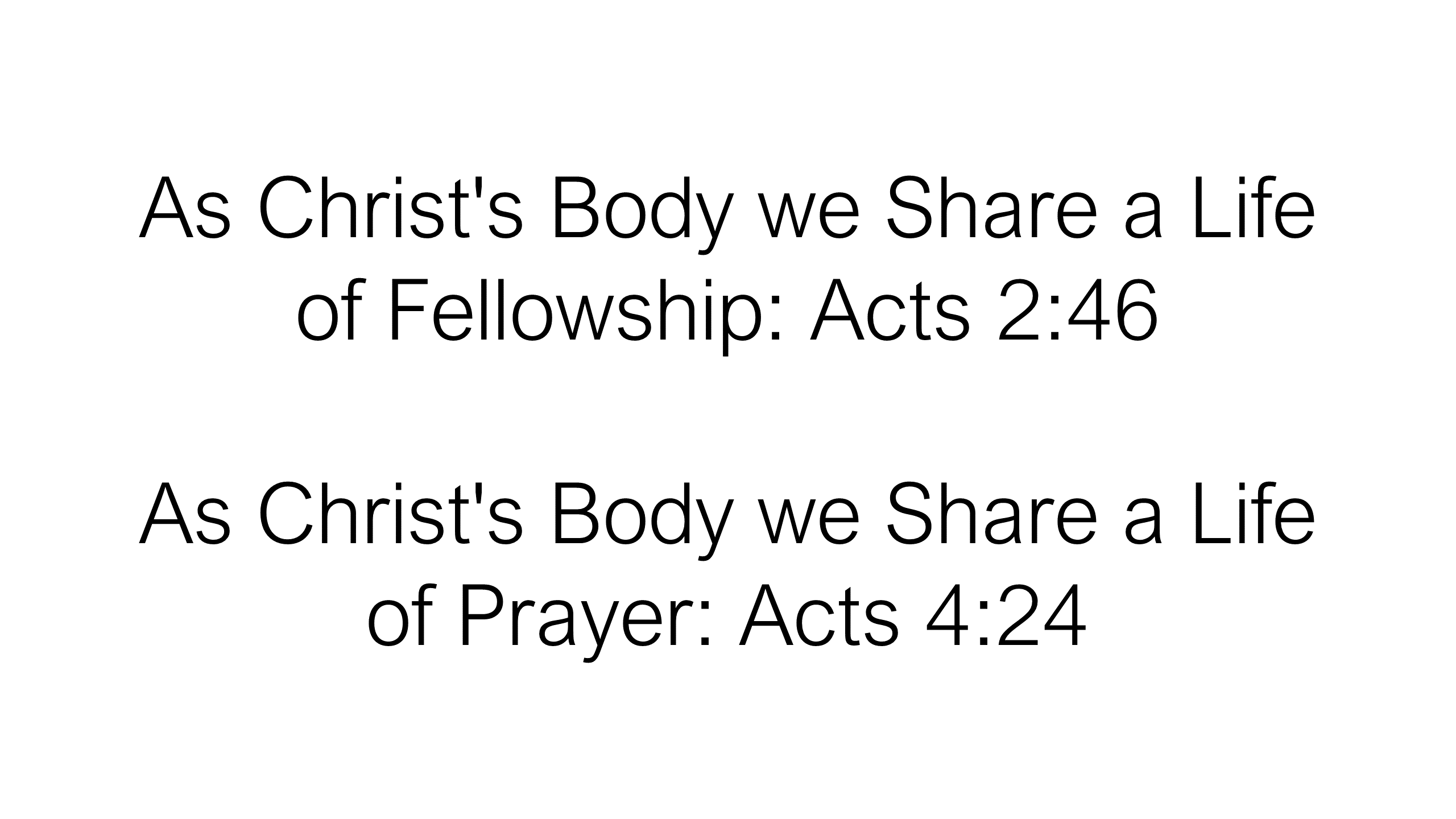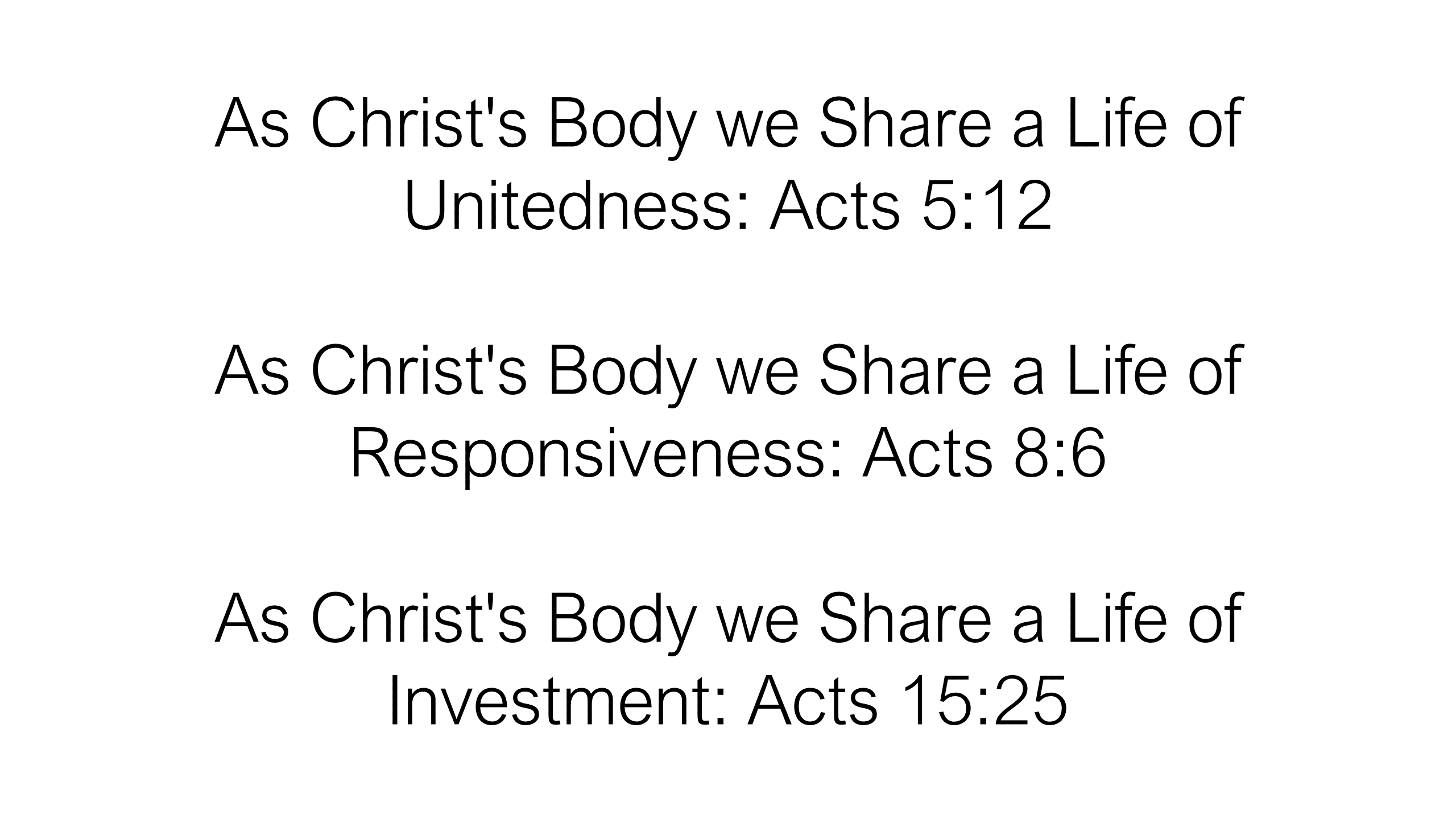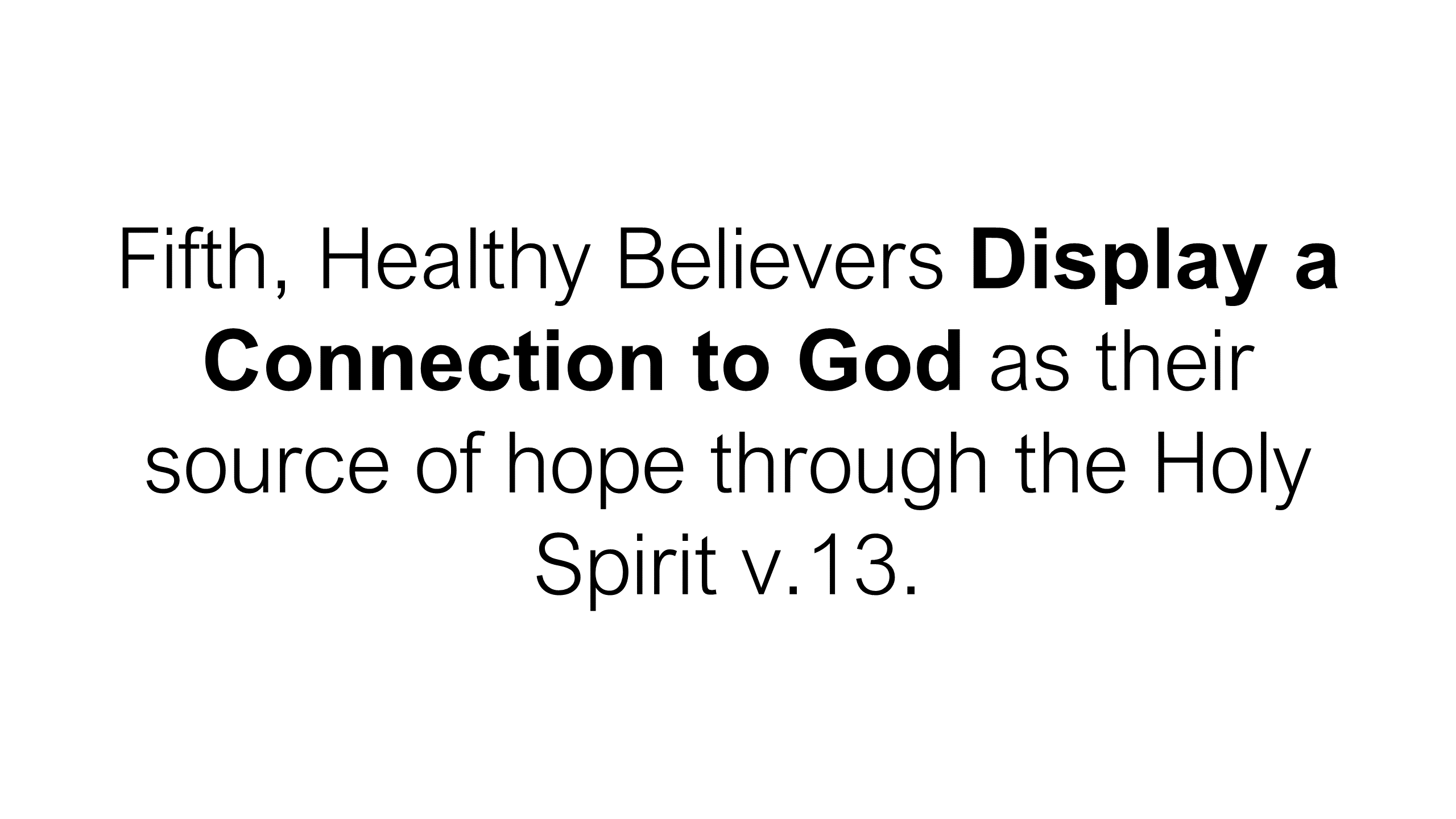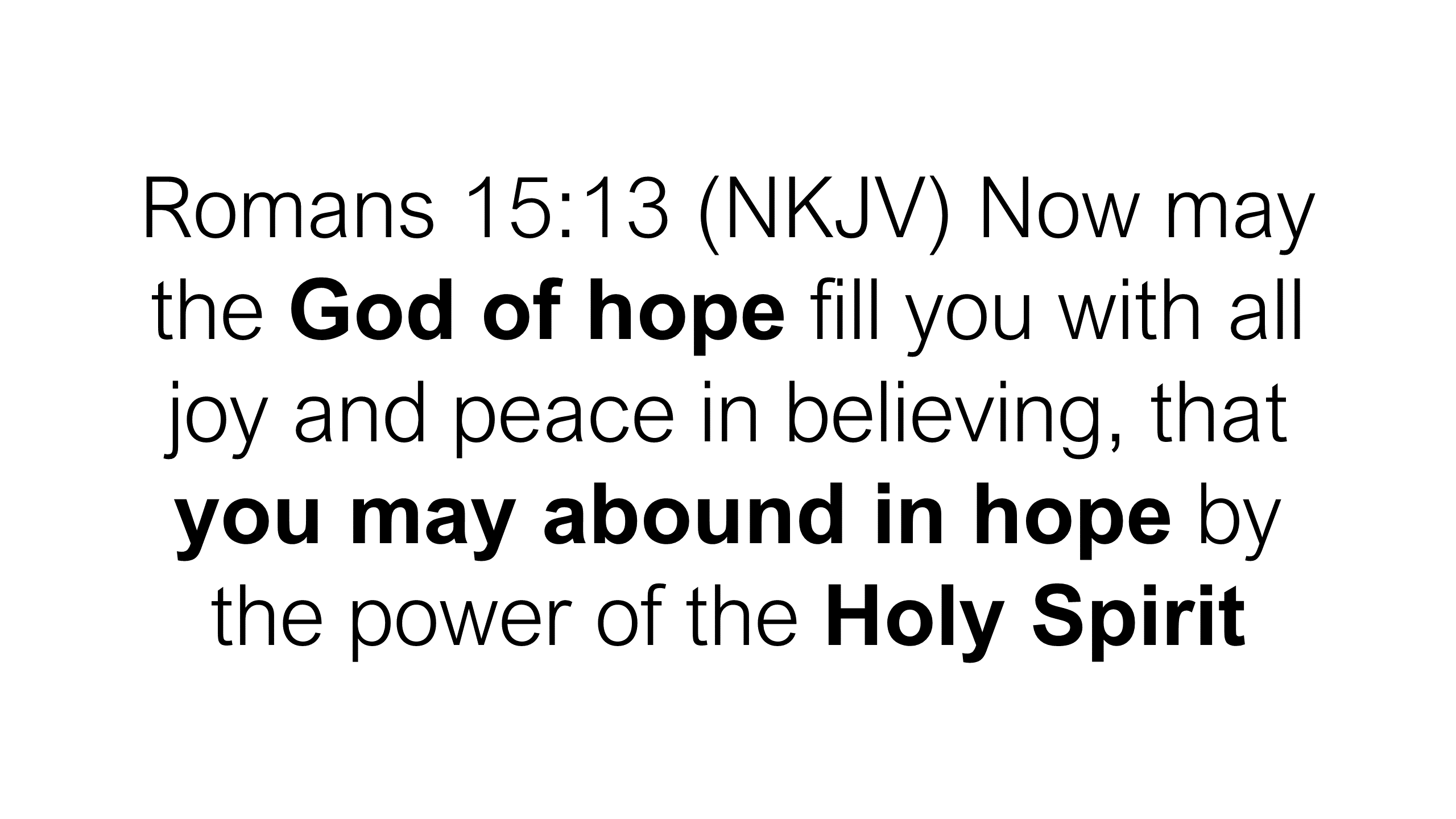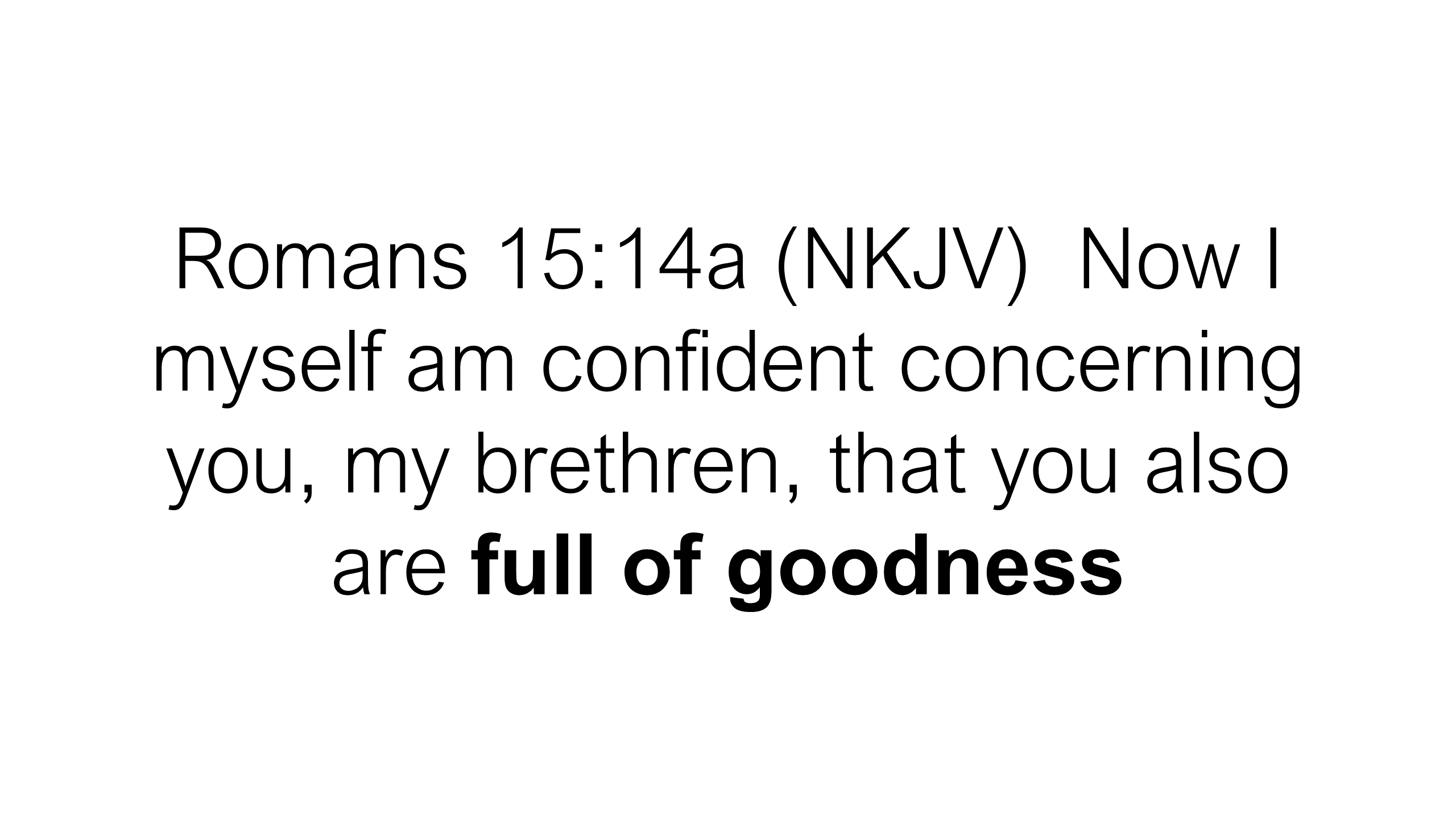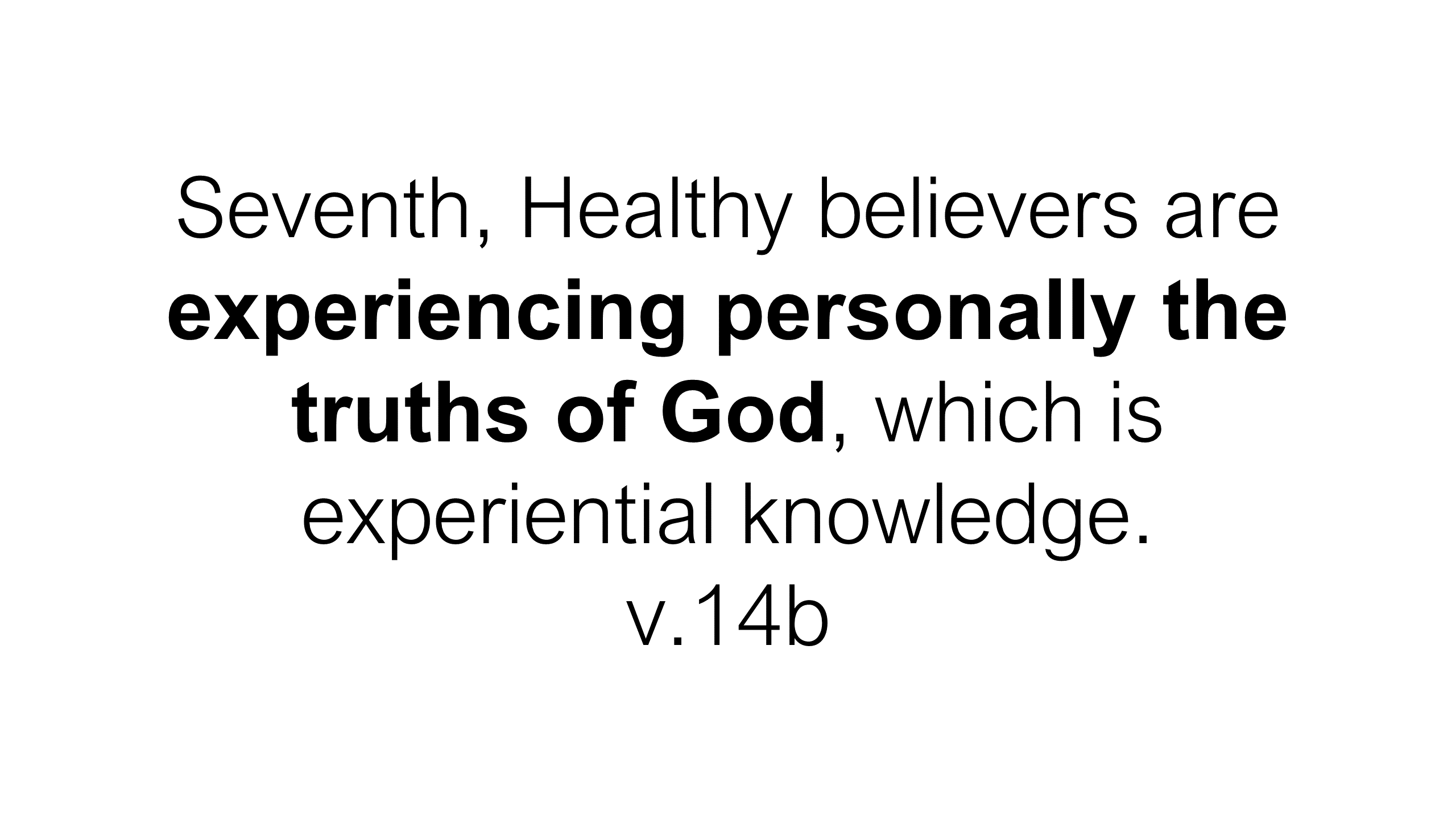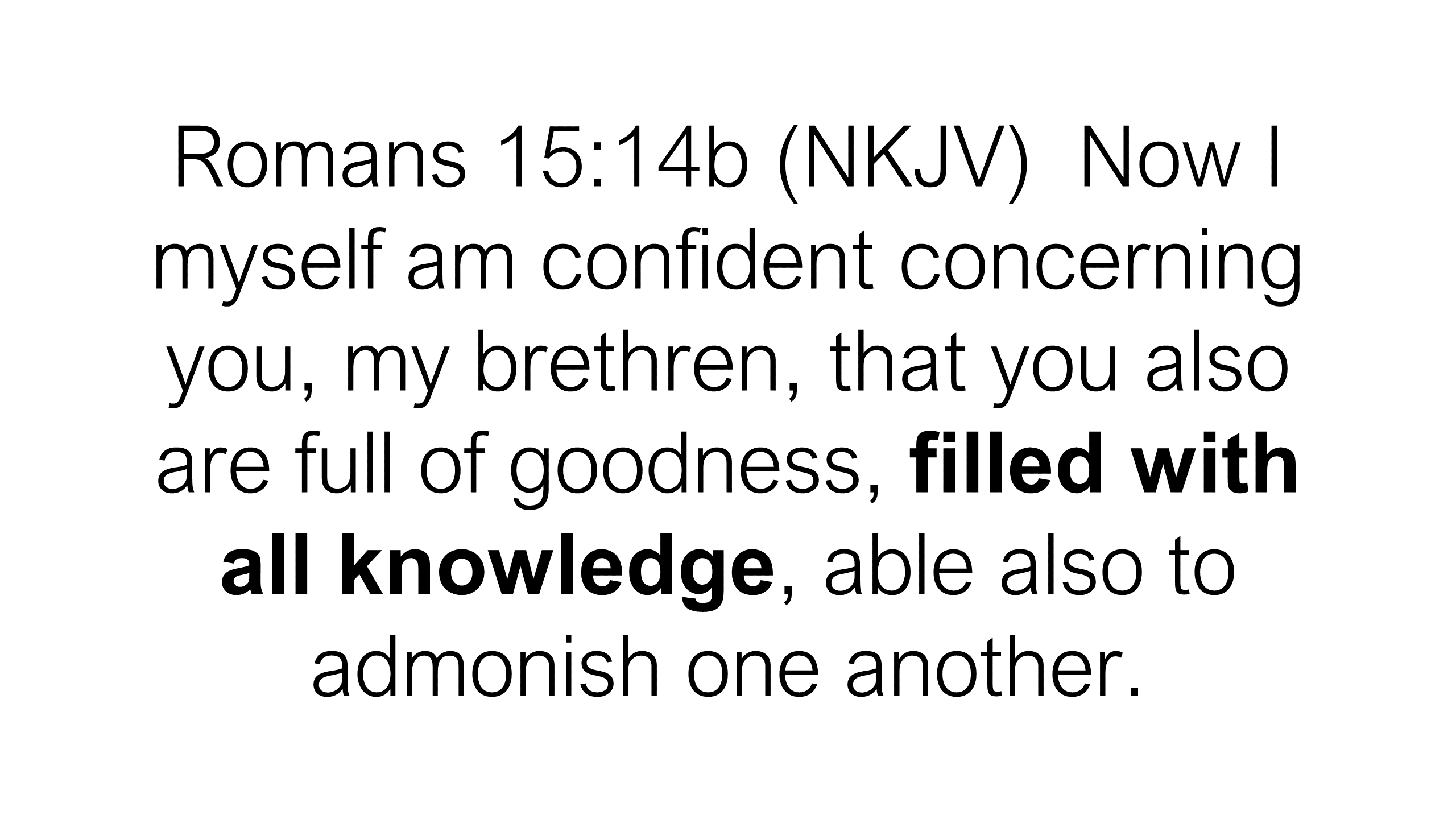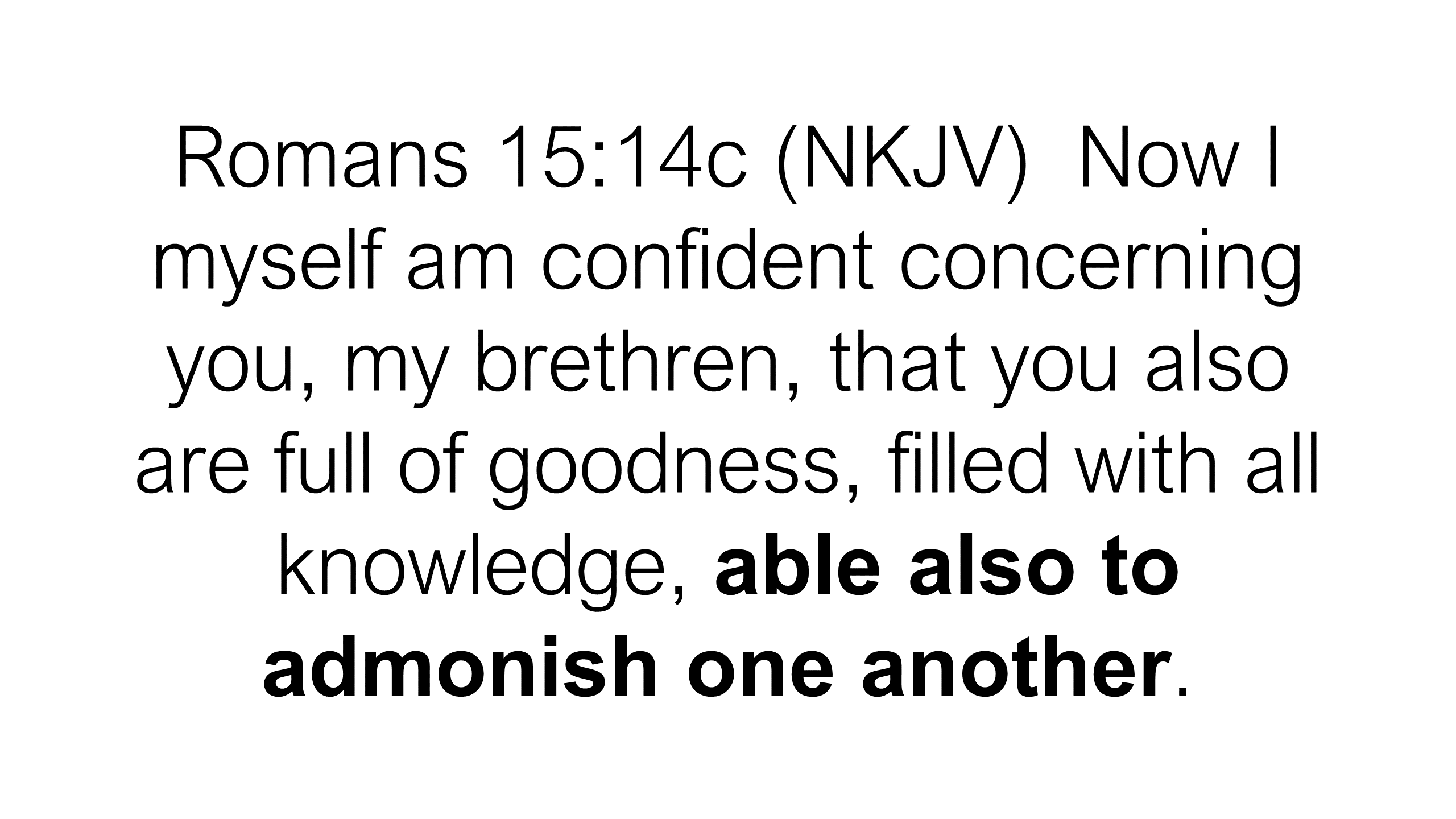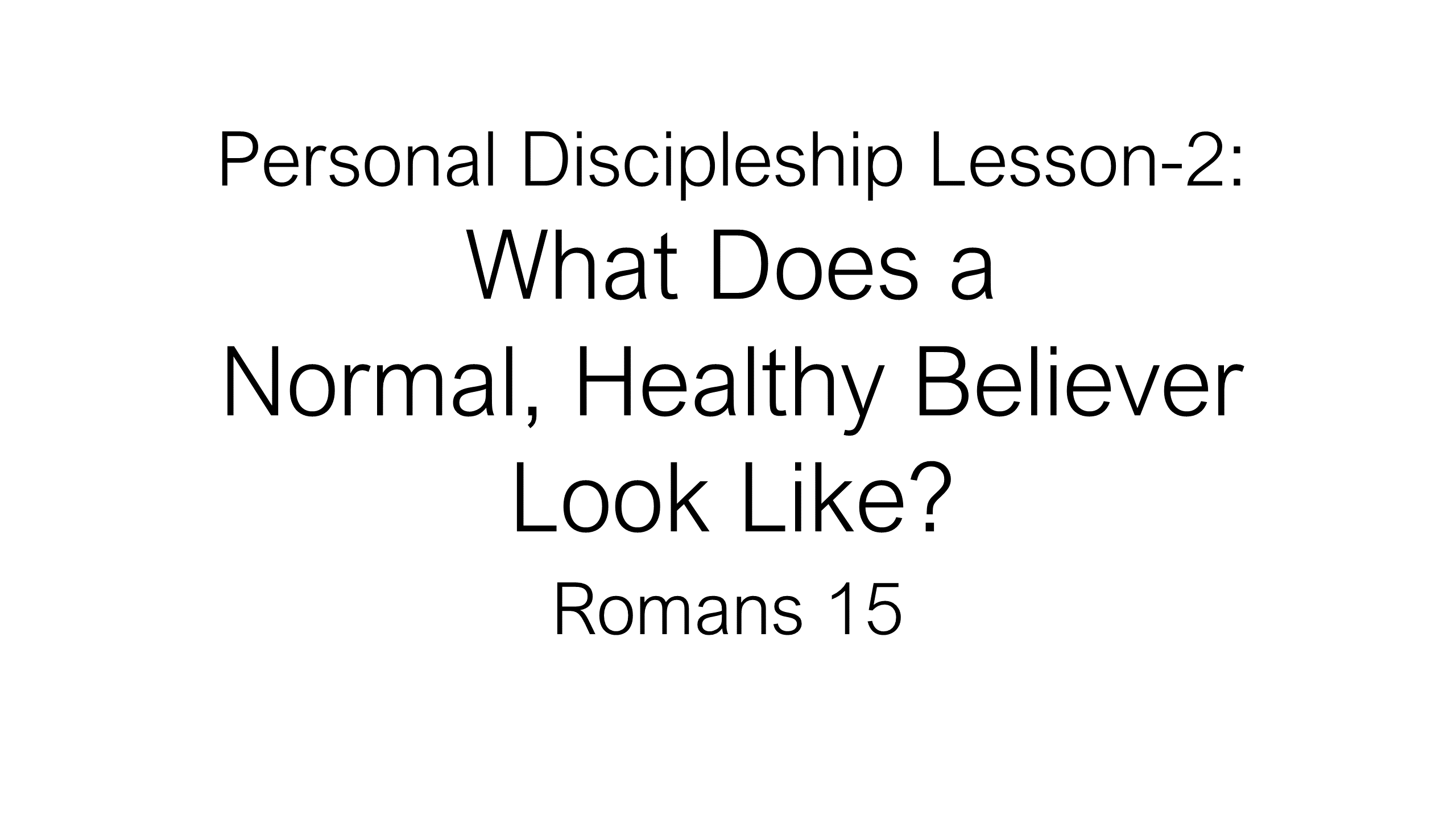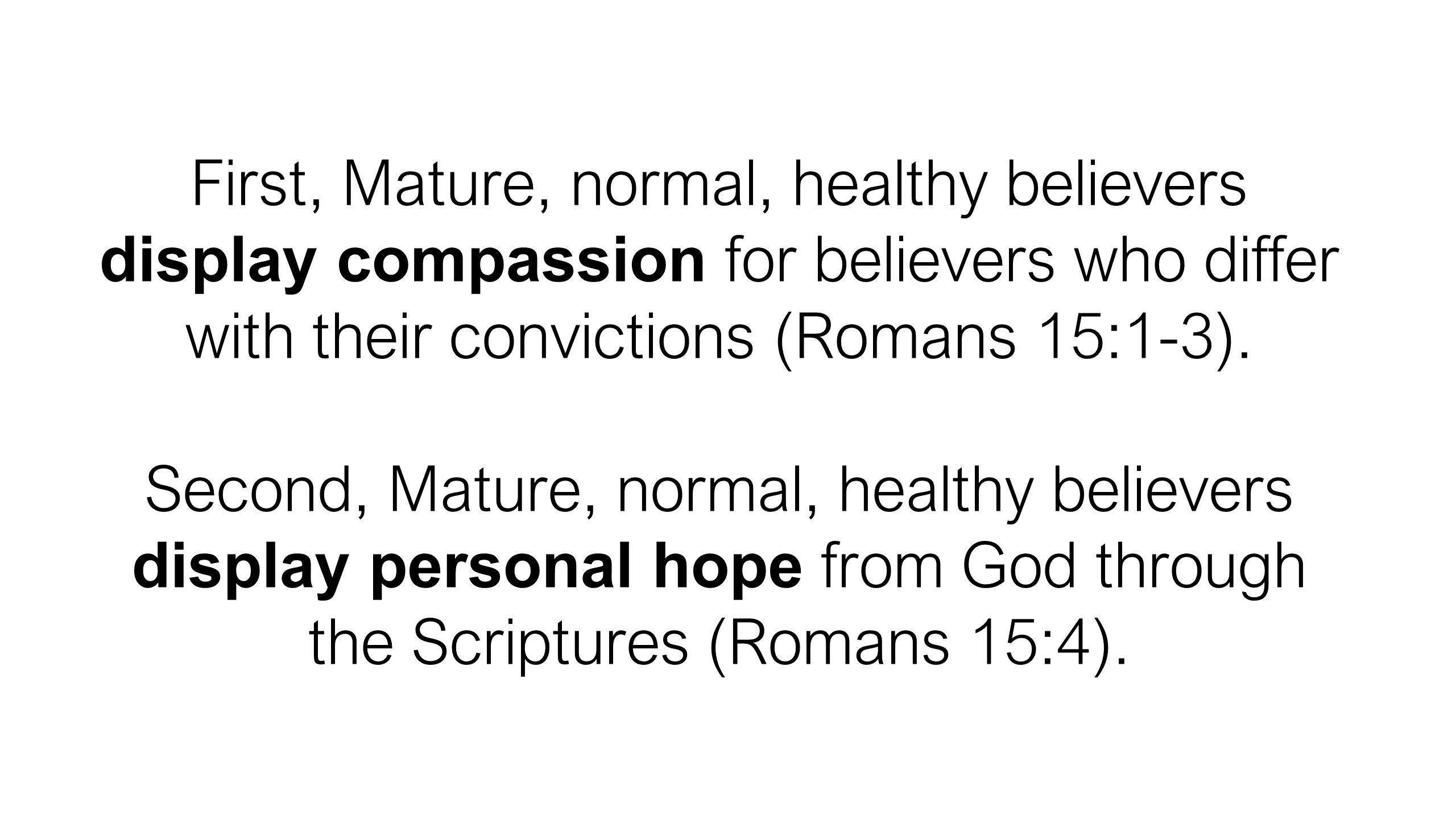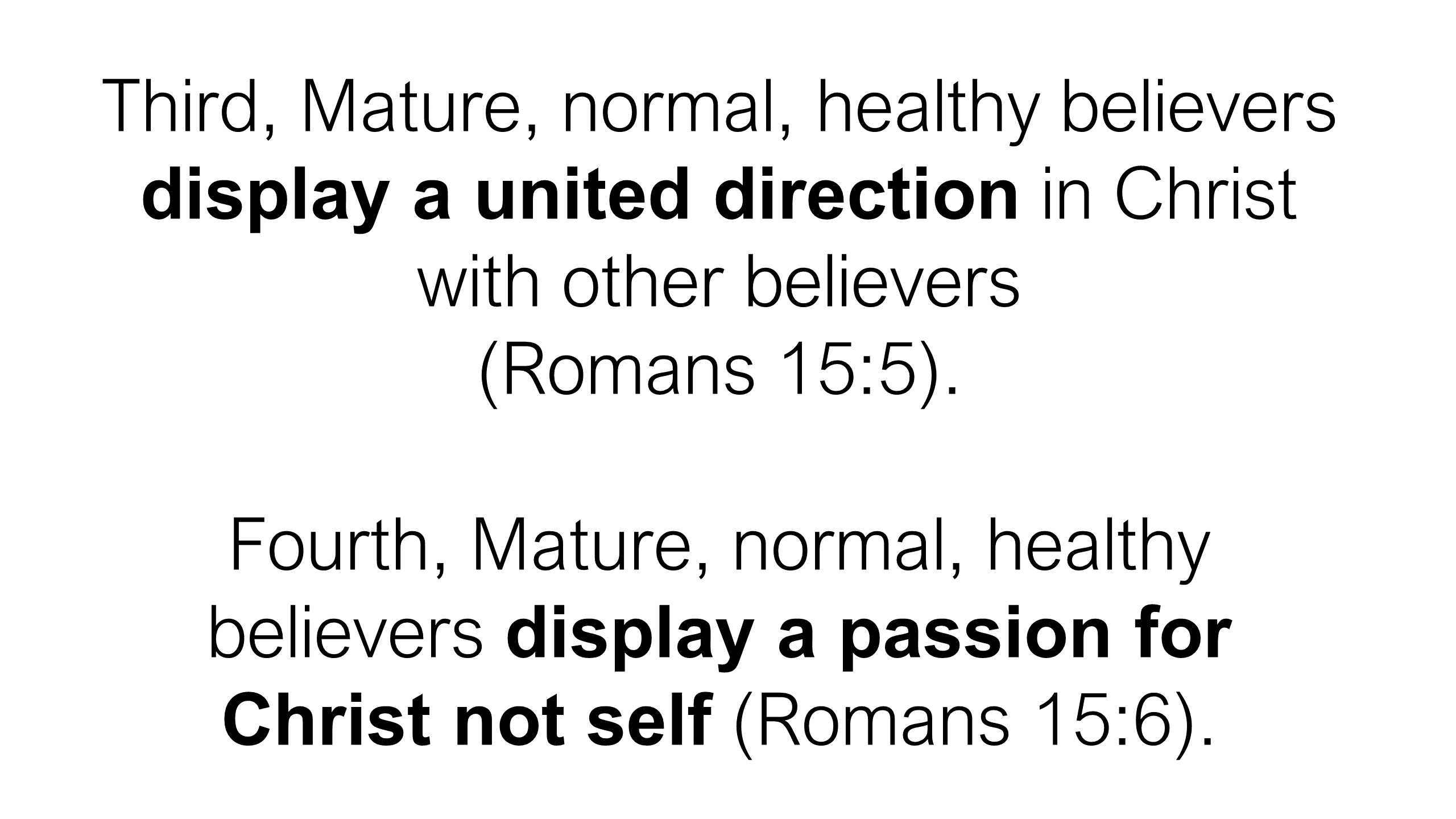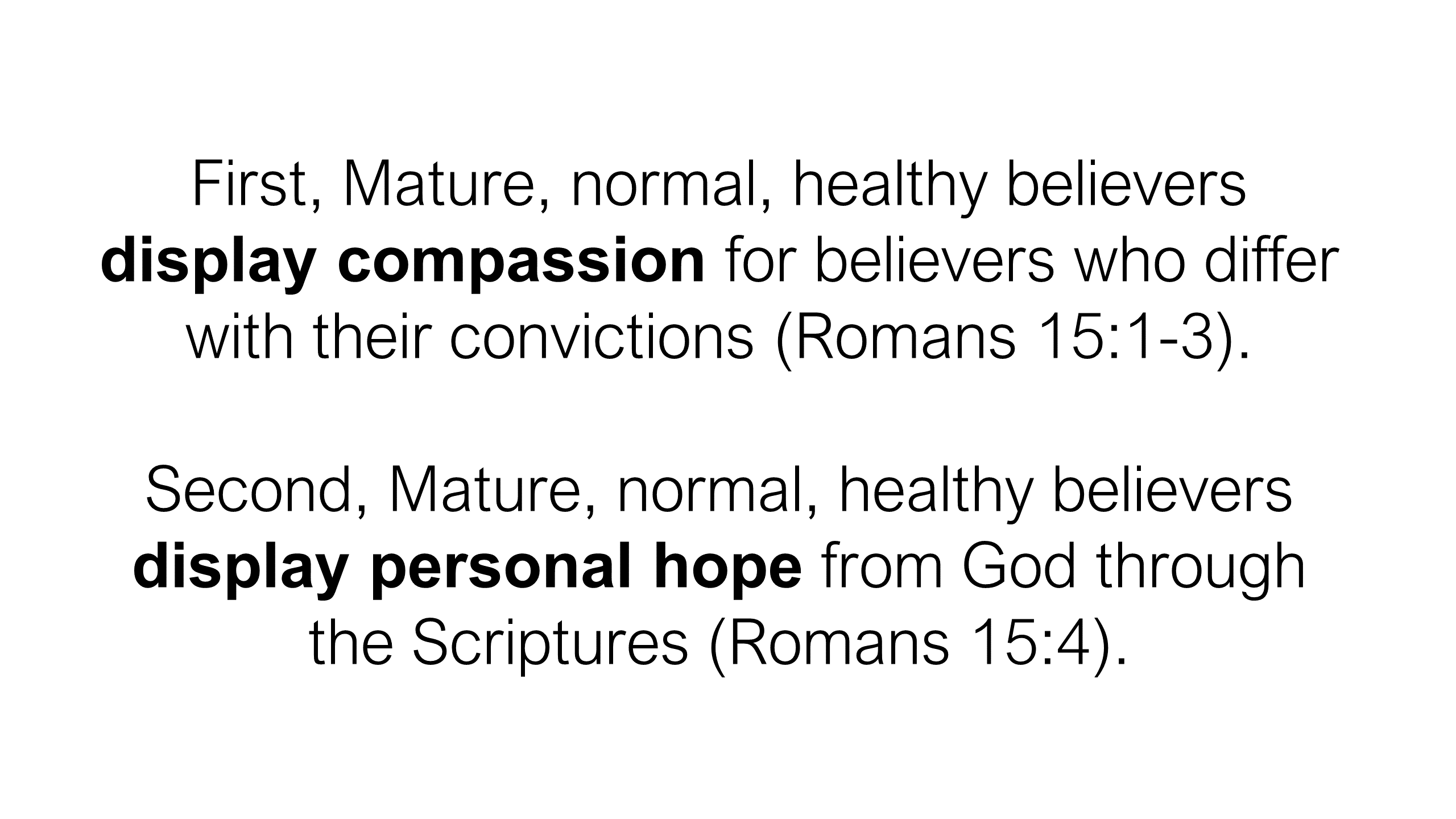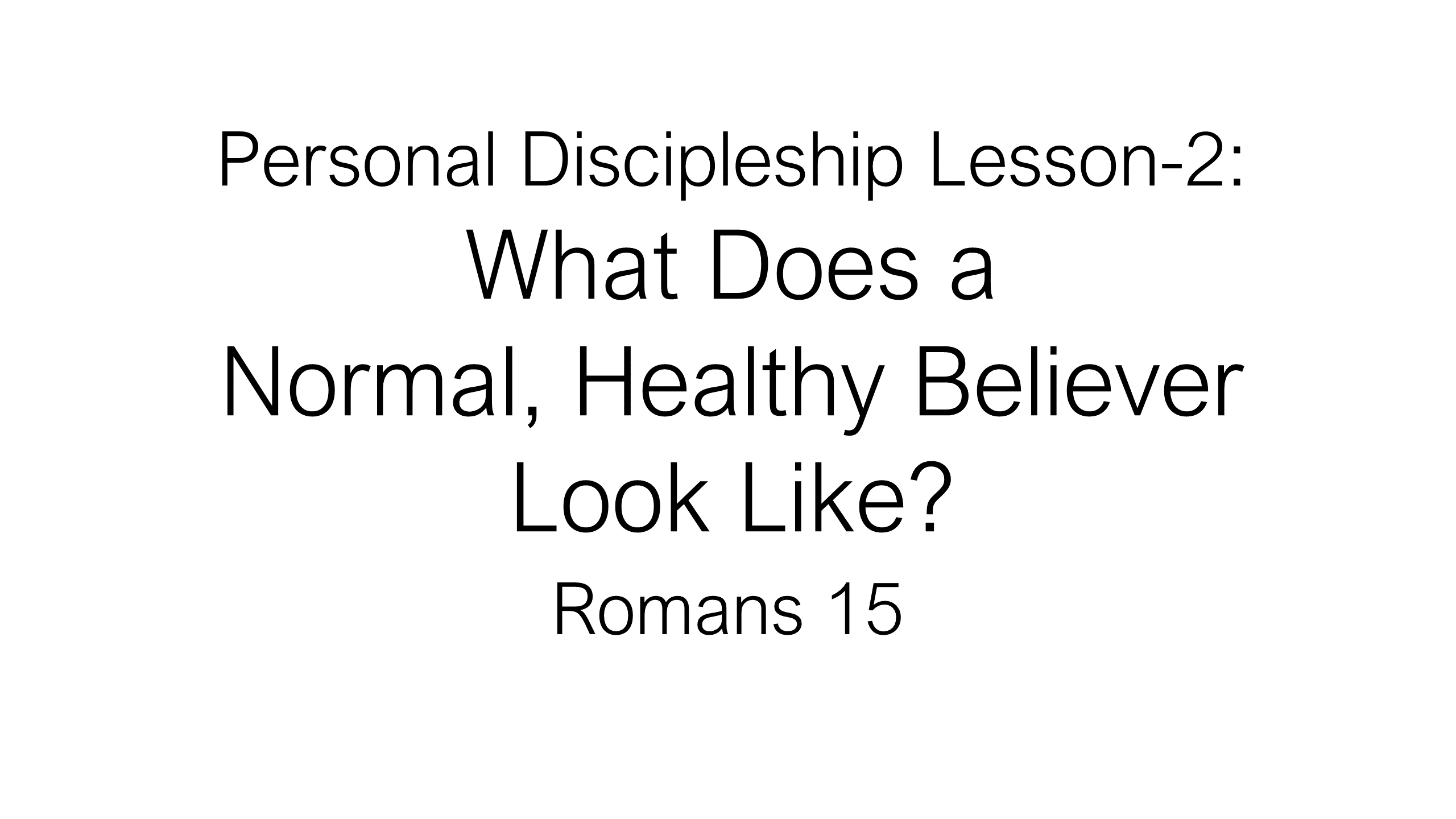If the YouTube video above is not available, here are two other ways to view:
A Normal Christian Look
FTGC-33b
140907AM
Transcript
Open to Romans 15. What you have just gotten to, is a session where I wish I could take every one of you to Panera or Starbucks or Water Street and disciple you. I wish I could. I wish Bonnie could take every lady in this place, one at a time, and go through discipleship, but that’s physically, humanly impossible. What we can do is encourage you to get together with some of the normal, healthy believers of Calvary Bible Church, because anyone who is normal and healthy and has any spiritual maturity has been called by God, for life, to be doing what I’m showing you this morning. I’m just showing you in a group setting what is to be going on all over this church in a one-on-one meeting. Discipleship is rarely in a group. It’s almost exclusively operated in a one-on-one setting. Jesus trained the 12, but if you notice He was taking three off here and one off there and meeting with them there and answering a lot of questions. However, He didn’t just do it in a session. He did it for three and a half unbroken years. Most of us can’t devote 42 months to disciplining someone so what we do is we go with one person for an hour or a half-hour or so at a time.
If I was meeting with you this would be our second session. The last time we gathered, I did session 1 about why we even need to do this and what the place of the word of God is. In Romans 15, I’m going to show you what I call the signs or the vital signs of healthy Christians. In the first service, I was talking about my blood pressure. We have so many doctors at Calvary, and I said, I don’t know what my blood pressure is, I can never remember it. I always have to write down. I said it’s something like 90 over 60 and a pathologist said, you wouldn’t be making it very well this morning. It’s 120 over 80, please. I said, okay, 120 over 80. If we were taking your spiritual pulse and blood pressure, you know, they measure against what’s normal. When they do all those blood tests and everything else they give you, you are this and this is what normal is. This range is what is normal. What I’m showing you this morning from God’s word is what normal, healthy, mature believers are like. If all of your systems are operated and God started those systems, this is what we look like. I’ll take you through as far as we get this morning.
Number one, believers display compassion for believers who differ with their convictions. That’s a sign of spiritual health and maturity and of being a normal believer. We don’t make everyone line up with whatever conclusions we have about how we’re supposed to operate. We do what we believe is right, and we nurture others, but we have compassion and I’ll go through that in just a minute.
Secondly, mature, normal, healthy believers, display the hope that only God can produce by His Spirit. They have that, it’s from God. The Holy Spirit uses the scriptures because the scriptures are the way we know. The way we know His character, the way we know His person, the way we know His truth, the doctrine of God so we will look at those in the fourth verse there.
Then the third mark of a mature, healthy believer is they display a united direction. In other words, they live in unity. They know the direction the Bible has said, and they’re united in that direction. The whole book of Acts has a keyword that I will show you. You’ve probably heard the word in the book of Acts, it’s called one accord. How many of you have ever heard of one accord? Let’s say that together. This is discipleship. I make them talk to make sure they’re listening, so I say, what word did I just say? Very good. See, and I would hear that at Water Street and if I didn’t hear it, I say you’re buying the coffee the next time because it cost $5.41. This verse says with one mind and one mouth. They don’t just believe it; you see it displayed in how they behave.
Then fourthly, they display a passion for Christ, not for themselves. Remember Paul said, I die daily. I am crucified with Christ, but I’m still alive. What that’s about is a mature, normal, healthy believer will have a passion for Christ. Everything else they’re not as passionate about. That’s why people come to us and they say, you’re different. Paul did a 180. Salvation transforms us. Do you know what the hymn says? Turn your eyes upon Jesus. Look full in His wonderful face and the things of Earth will grow, what? Did you catch that? Strangely dim. Nothing else. Nothing else comes up to the height of our passion for Christ. We’ll look at that and explain that.
Fifthly in this passage, a mature, healthy, normally rich display a connection to God. This is what’s so important. If you went down to Stadium Drive, we have a lot of car dealerships all along there. If you went and looked at a car, and you looked at the sticker, and you looked at how shiny it was, and the color of the paint, and you opened the door and smelled it, but you never bothered to get the keys. You never actually see if the windows work, and the wipers work, and if it starts, and if there’s even a motor under there. Wouldn’t it be disconcerting to think that you have a car and to pop in there and stick the key in and nothing happens? You lift the hood and there’s no motor. Yet we have a whole group of Christians that we have never checked to see the reality of whether all of these systems work.
How about driver’s ed? What would you think of someone going to driver’s ed and all they did was watch videos of good drivers? They talk and say I love to drive. I love the wind on my face. I love to look out all the windows of the car. I love the feel of the seats. Even in a simulator you never let them drive. Wouldn’t that be scary if you gave them a license and a set of keys? That’s what we do in Sunday school classes across America. As long as they’ll listen to the lecture, we figure they know how to drive. Christ didn’t think that was sufficient. He only lectured the crowds. He pulled the individuals aside and asked them all kinds of questions, and interacted with them to make sure they displayed a genuine connection to God as the source of hope through the Spirit. We’ll see that verse 13.
Sixthly, and this is so neat. Healthy believers are filled with the Holy Spirit. When you’re full of the Holy Spirit, He produces the fruit of goodness that fills your life. Did you know, you can know this morning if you’re truly born again? If you’re truly born again, God is doing something. Some people broke in, after the Gulf War I & II, to the military warehouses and got some of the military gear that had a degree of radiation to it. There were some barrels of waste and they dumped it out and took the barrel home. What happened is that long-term they began to have produced in their lives the fruit of being around radiation. That’s a negative illustration, but they didn’t see it, they couldn’t smell it, there’s no taste to it, but just the presence of radiation slowly caused them to be sickened. Did you know, in a positive sense, you can’t have the very Spirit of the infinite God move into your life without Him producing a byproduct? That’s called the fruit and the one that Paul talks about here in verse 14 is goodness.
Seventhly, healthy believers personally experience the truth of God, which is experiential knowledge. What I’m going to show here is that it’s not enough to know the facts. It’s whether or not you have experienced them, whether or not you have tested them, whether or not you have driven, whether or not you have started, whether or not you know how to.
We got out of the elder meeting Thursday night, it was about 10 o’clock or 9:30 and I looked over in the back parking lot. We have a driver’s ed school going on here in our parking lot almost 24/7. There were cars out there and cones and people were directing. The student drivers are all from the apartments. They use that as a little driving course and they’re driving around the cones and they’re backing up and everything. Can you imagine someone saying they know how to drive, but they’ve never done any of that stuff? You wouldn’t loan them your car. Yet, this is what the early Church did. The early Church ran a medical surgery clinic, where everyone was trained in surgery, not just in the classroom. They had to go into the OR, and they worked alongside someone else. That’s what discipleship was. Do you experience personally the truth of God? Do you have experiential knowledge?
Then finally, believers understand and use God’s word and that’s ministering to one another. Healthy believers feed on the doctrines of God’s word and display spiritual strength and growth. Look in your Bibles, and I wouldn’t go through all those points with them, but I did it for you so you thought we were going somewhere. I would just go to the first one, which I’m doing right now. Look at verses 1 through 4 and I read it with them. If you’re meeting with someone you don’t know very well, they might not even know where things are in the Bible, so I help them. I say, do you know where Romans is? I show them the index and how to find it on the page number, or I’ll show them where it is if they know the layout of the Bible. You show them that. You get them to 15 and you have them working with you. I read a verse, they read a verse and you discuss. See, it’s not a lecture. Discipleship is a dialogue. It’s going together. It’s leading them down a pathway, holding their hands spiritually. In verses 1 through 4 what I’m looking at with them is what it means to feed, what doctrines are, and how you display spiritual strength and growth because that’s what this passage is all about.
“We then who are strong ought to bear with the scruples of the weak, and not to please ourselves. Let each of us please his neighbor for his good, leading to edification. For even Christ did not please Himself; but as it is written, ‘The reproaches of those who reproached You, fell on Me.'” Verse 4 is your turn. Okay. You guys are on the other side of the coffee table. You have to buy the coffee if you don’t participate. Whatever version of the Bible you have, let’s read verse 4 out loud together. Are you ready? 1, 2, 3, go. “For whatever things were written before were written for our learning, that we through the patience and comfort of the Scriptures might have hope.” We all had about the same amount of stuff. Okay. That’s what this passage is about.
The next thing I do is I go through the verse with them. I show them, I point out words and I say, hey, what do you think this means, the strong people? There are strong Christians and if there are strong, there are weak Christians. I say, do you understand what a strong Christian is and what a weak Christian is? The Bible defines that. Then I say, this is so important. One of the underlying messages of the scripture is we’re supposed to be pleasing God, not ourselves. The underlying motivation of a godly believer is they’re not in this to please themselves. Let each of us please his neighbor. At that moment I might ask, do you remember the little song you had to learn in five-day clubs, good news clubs, or VBS or something? It went like this…Jesus and others and you, what a wonderful way to spell joy… There we go. Hey, someone else was in my club. Did you catch that? It says Jesus and others and last place you. What a wonderful way to spell joy. See that helps you see the priorities of life. Look back at what it says in verse 2, “Let each of us please his neighbor for his good.” Jesus didn’t come to please Himself. That’s essential for us to understand the message. Let me get back here to where I was.
Then, leading to edification having to do with building up. It’s like what you’re seeing going on with the stadium on-ramps, they keep dumping dirt and pushing it down and moving it around and doing stuff. They’re building it up, getting ready for everybody to go to Costco. I don’t know why they’re doing it, I just assumed it was that. “For even Christ did not please Himself.” Then look at this, “For whatever things were written before.” This is a time I say, what do you think he’s talking about here? Talking about the Bible. What Bible did Paul have? How many books were there of the New Testament in the time he wrote this around 55 AD? You say, how do you know he wrote it in 55AD? You get a study Bible. If you want to disciple someone you must have a good study Bible. I’ve told you my favorite is the MacArthur Study Bible, but there are many study Bibles. I would get one that addresses the theme, message, and the dating of each book that answers any alleged discrepancies that you would come up with when someone’s talking to you. I say all scripture, everything that was written before was written for our learning.
This is a time that you would talk about 2 Timothy 3:16 and 17, “all Scripture is given by inspiration of God, and is profitable for doctrine,” that’s what’s right, “for reproof,” that’s what’s wrong, “for correction,” how to get right, “and for instruction in righteousness,” how to stay right. See, what’s right, what’s wrong, how to get right, how to stay right. That’s what the scripture is for, it’s for our learning. Did you know that reading the scriptures cultivates patience? Just reading God’s word as a believer connects us to a God whose Spirit indwelling us produces patience. That’s why, if you’re a regular reader of God’s word and you’re meeting with the Lord, people should notice that you are more patient the longer you live. You can read the Bible and be impatient, but it means that you’re either bulimic or anorexic; you’re spitting out right away or you’re not digesting food. You’re just avoiding it. You and I, through the scriptures, have patience and comfort just by us interacting with God and all of that produces hope. Those are the things that we’re going to talk about when we’re going through this.
Number one, healthy believers display compassion for other believers who differ with their convictions, and they’re concerned about others more than themselves. That acronym, joy, Jesus and others and you become operative. I take the time to go through verses 1 to 3. I didn’t even print out verses 1 through 3 so let’s just look at it. What does it mean in verses 1 through 3? Look at your Bible instead of the screen. “Those who are strong,” I say, does the Bible describe what is a strong and a weak believer? I always disciple with a notepad and the reason for that is everything I say, I’m writing down. What’s interesting, number one is that it encourages them to write stuff down. Number two, it helps you to be able to reinforce past points, and also it keeps you from perambulating around a pool of veracity, which means you just talk and don’t say anything. What is the weaker brother in this verse? Look what it says there. “Those that are strong ought to bear with the scruples of the week.” We have the weaker brother and the stronger brother.
What is the difference in the Bible? The Bible says the weaker brother is the one that has the stronger convictions. He also has the most, it’s like he has a conviction about everything. Everything. Don’t eat. Don’t go there. You shouldn’t do that. The weaker brother is walking on this little narrow path trying not to do anything wrong. Trying very hard for many reasons. In the Bible in 1 Corinthians 8 and 10 and Romans 14 and 1 Corinthians 14, all of these talk about the background of these people going to their idol temples. Those idol temples had animals brought in that were offered to a false, demonic, satanic God. Then they were slaughtered by the priests, the blood used in the process and the meat was the freshest meat in the city because they had this parade of sacrificial animals to Zeus. The priest ran a little side market where they were selling all this stuff, given to the gods to support themselves. Usually, people brought their best, even the Jews brought their best sacrifice.
Think about the implication. Here in town is a pagan temple and this temple has inside of it, horrific stuff going on. Most pagan temples had some degree of immorality somehow connected to them. Connected to the temple is the best meat market in the city because they had a constant stream of the freshest and best cuts of meat that were coming in the front door. What happened is people that used to be involved in this get saved and the weaker brother wants to stay as far away from that place as possible because he knows what goes on inside that temple. All the sensuality and immorality in a cult and everything. All of a sudden, the weaker brother is as far away from that place as possible, and he sees one of his brothers in Christ going in and coming out of the meat market. He’s horrified. He thinks what if they went through the meat market and maybe they did something there. The devil is there and all the evil and the immorality and everything else. They’re just a thrifty shopper and they got the steak special. The weaker brother and the stronger brother agree that false gods are wrong, immorality is wrong, sensual sins are wrong, they believe that the occult is wrong. However, this stronger brother realizes that you can go to the meat market without being involved in false worship, sensuality, and the occult. This one won’t even get near the place.
With that in mind, look at what happens. The weaker brother has the stronger convictions. Don’t go near the temple. Don’t buy any meat from the temple. How do you know that there isn’t a demon attached to the meat you bought at the temple? The stronger brother is mature. He, as it talks in Hebrews 5: 14, actually 12 to 14. By the way, some of you are saying, how did you know that’s in Hebrews 5? Because I went to biblical counseling, that’s how I know. We had to mark that verse a hundred times in two years. They are stronger because they are exercised biblically. They exercise biblically. Instead of just thinking that buying meat at the market is wrong, they look in the scriptures and they say, does God say that? What does the Lord say our liberties are? We’re in the world, we’re not of the world.
Go back to the original text. They display, verses 1 through 3, compassion. See a mature believer. This happened to me in my life. I grew up at Lake Lansing Baptist Church, a conservative Baptist church in Lansing, Michigan. I’ve told you before I went there before I was born. My parents never missed a service. I think I came the day I got out of the hospital. I was there all the time. Both of my parents were alcoholics and got saved. Both sets of my grandparents were alcoholics. Everybody in my family I knew drank. My parents met in a bar. I could just tell you stories about the terrible byproducts of drinking and alcoholism and drunkenness. When my parents got saved, anything to do with alcohol was absolutely wrong. I grew up in a family where anybody that drank was lost, unsaved because everybody we knew that was lost, drank. You just add those two together and it just becomes that if you drink, you’re unsaved.
I go on my very first missionary trip to risk my life going behind the iron curtain, taking Bibles into communist countries and Muslim countries. I got assigned to a team of seven Europeans and one American, me. We’re sitting there in the training center, and they briefed us and showed us the map, loaded our car, and they say, now you have today to spiritually get ready. You might be captured by the communists. They will imprison you and often do all kinds of stuff to disorient you. They couldn’t harm you because you’re an American or German or whatever, but they do try and scare you. They said you need to get fortified spiritually. Go take your Bibles to the training center, it was beautiful. It was in Europe. You could go out and sit, and we’d read. We all got out to our training center. I sat with my Bible, and they sat with their Bibles. I heard seven long neck bottles of beer. They’re all drinking away as they’re reading the Bible. I immediately thought, oh no, I’m on a team and they’re all unsaved. A mature, normal, healthy believer, if my teammates had been that, would have had compassion for me. As soon as those seven Europeans saw my horrified look, they began to carry their alcohol with them everywhere they went just to tease me. They would set it on their Bible. They would carry it in their pocket. They would try to drink in front of me all they could.
Look at what verse 3 says, “Those who are strong ought to bear with the scruples of the weak, and not to please ourselves. Let each of us please his neighbor for his good, leading to edification. For even Christ didn’t please Himself.” What are we supposed to do when someone believes something’s wrong, and we know it’s not? Paul gives us the answer in those passages I told you about right here. Do you know what Paul says? You can read Romans 14. He said I won’t drink again in the presence of someone that thinks drinking is wrong. I will never again touch alcohol. I’ll not eat meat or drink wine while the Earth exists so that I don’t offend. Is that the normal attitude? No. Do you want to know what 21st-century response is? If you find someone that believes something that you do is wrong because they believe from the Bible it’s wrong, you immediately call them a name right here. You say you are a legalist. If you know anything about theology you would never do that because a legalist is someone that thought that they could earn salvation by keeping the law or the Sabbath or the diet or whatever. No. If they want to be proper, nobody should call anybody a legalist except a Roman Catholic working their way to Heaven through the sacraments or some person that is involved in putting someone back under the law. A lot of these messianic-type groups are saying you’ve got to observe all the law, or you won’t go to Heaven. Also, someone that says you have to be baptized to be saved. Keeping the law to go to Heaven, being baptized to go to Heaven, or keeping the Jewish system to go to Heaven is legalism. Most people are not legalistic.
What they are externalists. They think that observing something externally makes them more spiritual. You can address that. Finally, the team leader with me said, did you know, Martin Luther drank? I said I never thought of that. They went through and they said we never get drunk, but we’re from European culture and we grew up with alcohol and all of us know that drunkenness is wrong. That was this compassion.
It’s time for communion, but at this point with my one-on-one thing, I’d say, why is compassion so important? I would say, what was the most frequent emotion of Christ? They’d say, I’m not sure. I’d say, do you know what the most frequently recorded emotion of Jesus Christ was? Compassion. I would take them to Colossians 3 and say, you need to clothe yourself. Colossians 3 says in verse 12, “put on tender mercies, kindness, humility, meekness, longsuffering.” It’s a choice. This display as a mature, normal, healthy believer only comes as a choice. You have got to want to be Christ-like. Jesus doesn’t come in and move all the furniture and we’re going, don’t do that. Don’t do that. He comes only by invitation. Every time I see one of those Two Men and a Truck things I think, they don’t go around and break into houses and take everything. They only go by invitation, and they’ll move your stuff. Jesus, by invitation, will come in and say, I will make you display My emotion of compassion. It’s what you do when you find someone that has all these rules in their life that you don’t have. Instead of you guzzling your longneck in front of them, you don’t even tell them you drink. You find out about them and maybe through Bible study, you could lead them where you have come, or maybe you might learn from them. That’s the first lesson.
For us this morning, it’s a reminder of how vital it is in the biblical record to get into a one-on-one nurturing, discipleship relationship. Jesus said I’m sending you in all the world to make disciples and once they become a disciple to teach them how to observe. The only way you teach someone how to observe is you show them how God has led you through His Word, you work with them until they understand that point, then you go to the next one. This is what spiritual, healthy, mature believers look like, and I can’t wait until the next point.
Let’s bow together for a word of prayer and I invite the elders and deacons and our godly men to come and pass communion. With our heads bowed and eyes closed, I would like to ask you a question. I would ask this at Water Street, and I wouldn’t even make them close their eyes, but with your head bowed and eyes closed, I’ll ask you a question. Number one, and you can answer silently. Do you believe that Jesus left you here to be His disciple, to follow Him, to learn from Him, to obey Him, and to please Him? In your heart, do you believe that He left you to be His learning, following disciple?
After you answer that, the second question is, when Jesus said I am leaving you here to be My servant in this world, to go into all the world and make disciples and to teach them to observe, do you think that you have a part in that? Do you think that the Lord saved you because He has a bigger purpose in life than you just making it through to the end, surviving, paying all your debts, and existing? Do you think there’s something bigger than that? Something you’re supposed to do for Him? Have you come to the point in your life where you say, Lord, I know I am here to lead other people to Christ and to train them how to follow You. I want to learn how to do that. I want to ask You for strength and grace and Your Spirit because it scares me. I don’t think I know anything. I don’t think I can do it, but I want to do it because that’s what You called me to do. I’d like to ask you this morning before communion, how many of you here today say, I believe that the Lord has called me to do discipleship as a believer, and I want to learn how to do it. Someday I want to sit across the table from someone with an open Bible and nurture them into following the Lord like me. If that’s you saying I’m not just a disciple, I want to be a disciple-maker because Jesus asked me to, with heads bowed and eyes closed, hold your hand up above your head so I can see. Hold them up high. Wow. More of you than the first service. Okay. You can put them down.
Let’s pray. Father in Heaven, that’s my desire, that’s Your desire, and that’s the desire that’s just been expressed by all these dear saints this morning. I pray that You would stir our hearts to look into Your word a little differently every day. To experience what it says and understand it so that we can communicate it to someone else. That’s only possible because of what we’re celebrating today. That You died for us, that we should no longer live for ourselves, but unto You that loved us and gave Your life for us. At this communion, we renew our gratitude for Your saving us by dying in our place on the cross. Thank You for the bread that portrays Your body, that on the cross became our sin so that we would never face the wrath of God because it was satisfied when every sin on You was laid. Thank You, oh, Christ. Bless our communion with You this morning. In the name of Jesus, we pray. Amen.
Slides
Check Out All The Sermons In The Series
You can find all the sermons and short clips from this series, 52 Greatest Chapters In The Bible here
Looking To Study The Bible Like Dr. Barnett?
Dr. Barnett has curated an Amazon page with a large collection of resources he uses in his study of God’s Word. You can check it out here.


